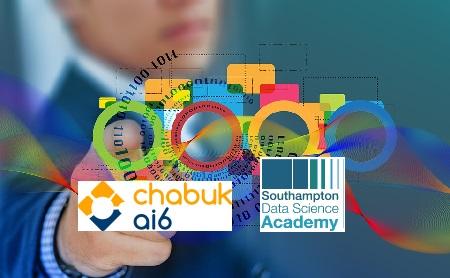
Duration: 4 weeks
Number of hours: 30 (Includes tutorial support + self-study, assignments and peer discussions)
Assignments: Three assignments (each worth 33% of the final mark)
This course equips you with the theoretical knowledge and both practical and technical skills to participate in the flourishing data revolution, helping you to contribute to and benefit from the new data-driven economy. The course emphasises a hands-on approach to learning data and skills, offering a number of interactive, online exercises that will let you try out many of the techniques and concepts covered in the taught material. In addition the course introduces theoretical AI concepts.
The course is broken into four weeks.
Week 1: You will get "hands-on" experience of Jupyter the web-based learning environment which you will use for the course exercises and assignments. This week also contains a Python Primer activity for those of you who are unfamiliar with the programming language or would like a refresher.
Week 2: You will learn about the fundamental terminology and processes in data science, discovering the technology landscape that has helped fuel the data explosion, and the tools that data scientists use to unlock the hidden value in these vast amounts of data. This week also contains an introduction to using Python for data science. You will begin gaining hands-on experience of data science in this week, focusing on collecting, storing and managing data.
Week 3: In this week you will understand how the data is analysed, covering a range of techniques that any data science team will encounter from statistics and machine learning and you will use Python to analyse some given data.
Week 4: Introducing use of search, clustering and knowledge graph processes. The case study in week four introduces in further detail the concepts of supervised and unsupervised learning to identify patterns which exist in data without classification labels. Such methods are used extensively by searching algorithms as they enable clustering of similar or closely-related results. By the end of this week you will have gained an understanding of the means by which todays search engines provide results and how the leverage structured information from knowledge bases to enhance both performance and user experience.
This module aims to provide you with the knowledge and expertise to become a proficient data scientist.
Having successfully completed this module, you will be able to:
Key benefits:
Chabukaisix Learn and Southampton Data Science Academy
Southampton Data Science Academy forms part of the Web Science Institute at the University of Southampton - ranked among the top 100 of universities globally.
Developed in partnership with leading global education specialists Cambridge Education Group (CEG), the Academy bridges the data skills gap in today’s increasingly data-driven world through world-class training and education from industry-leading academics and thought leaders in the field of data science.Email us for more information
Chabukaisix Learn: +44 1869 717167 learn@chabukaisix.co.uk
Chabukai6 Ltd: +44 1869 717167 info@chabukaisix.co.uk


